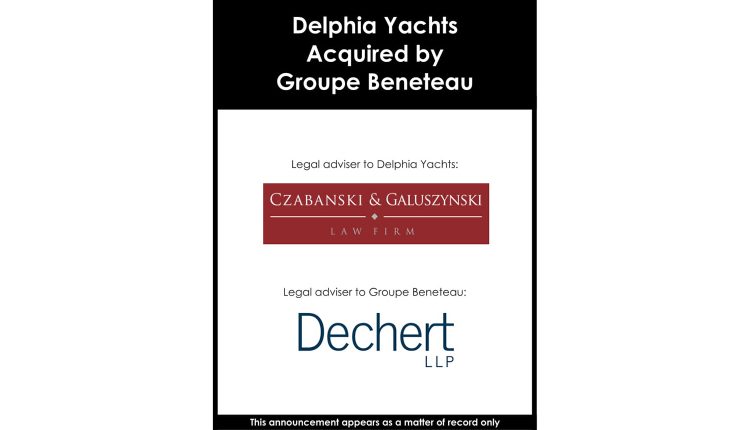Czabański & Gałuszyński Law Firm advised Delphia Yachts Kot sp.j. and its owners in a transaction with Ostróda Yacht Sp. z o.o., part of the Beneteau Group, one of the largest motorboat manufacturers in the world.
As part of the transaction, the Beneteau Group’s investment will consist of establishing a new entity with Delphia Yachts Kot sp.j. which will continue and develop Delphia Yachts’s existing activity using all available synergies from the Beneteau Group. At the same time, the current owners, while remaining minority shareholders (20%), will ensure stable continued growth, smooth operational management, and capital integration with the Beneteau Group.
The conclusion of the Agreement means a new chapter in the almost 30 year long history of Delphia Yachts, whose previous achievements prompted the global concern to invest in Delphia Yachts Kot sp.j. This decision was in recognition of the need to strengthen and consolidate the market, and will allow the joint implementation of key strategic goals, such as:
- improving industrial efficiency by further strengthening production potential;
- deducting development costs by conducting internal activities and investing in prototypes and Delphia Yachts’ R&D centre;
- further strengthening the sail and motor yachts offer;
- developing presence in new markets.
Czabański & Gałuszyński Law Firm’s lawyers advised Delphia Yachts and its owners from the very beginning of the investment process, including developing the transaction structure, negotiating and preparing transaction documentation, as well as providing support with all activities from the signing of the investment agreement to transaction closing.
The Czabański & Gałuszyński team’s work on this transaction was led by Tomasz Siembida, Partner and Head of the Corporate / M&A practice, and supported by lawyers Tomasz Maślak, Bartosz Lewandowski and Kinga Mogilnicka from this practice.
The Beneteau Group has been represented by the Paris office of Dechert law firm; the team of Dechert’s lawyers was led by Ermine Bolot supported by Benhoud Derradji.
Interview with Mr. Tomasz Siembida – Partner at Czabański & Gałuszyński Law Firm
What must you consider when developing the transaction structure?
This includes an extensive number of factors. I usually start from the end and define what the client expects as an outcome and whether these expectations are able to meet the expectations of the other parties in the transaction. If so, we then have to analyse a number of elements along the way: what business we are dealing with, whether it is regulated or not, in what form it runs in, the scale or nature of the parties’ activities, including ascertaining what is the real value in a given business (whether these are tangible or intangible assets, or maybe a base of customers), what the tax situation looks like, what liability rules will be acceptable to the client during the transaction and after its closure, and how the transaction will be financed.
So you can see there are a huge number of considerations requiring bespoke definition, as each transaction is a completely separate case.
What skills must you acquire when negotiating during the documentation process? What challenges arose for you here and how did you overcome them?
This particular transaction had its own specificity, which affected both its structure and the way it worked. Our client was not an institutional client, but a family who successfully built their business, and after years decided to reduce their involvement. Each of the family members have their own preferences, goals and style. The trick is to find a common denominator, both on the communication level and understanding the interests of individuals. This is an additional task, but if it succeeds, as in this case, it gives you extra satisfaction.
What area in the following transaction did you and your team need to provide most support on, and why?
For a client who sells a business that he built for most of his life, it is usually the first and the last transaction of its kind. Such a client, unlike an institutional client, fund, bank or investment company, is not necessarily used to and has the right not to know something that we call “market standards” in the scope of transaction execution, transaction documentation or negotiation methods. First and foremost, you need to provide the client with a sense of trust and work on a common understanding of transaction mechanisms, which at the end of the day the client confirms with his signature.




